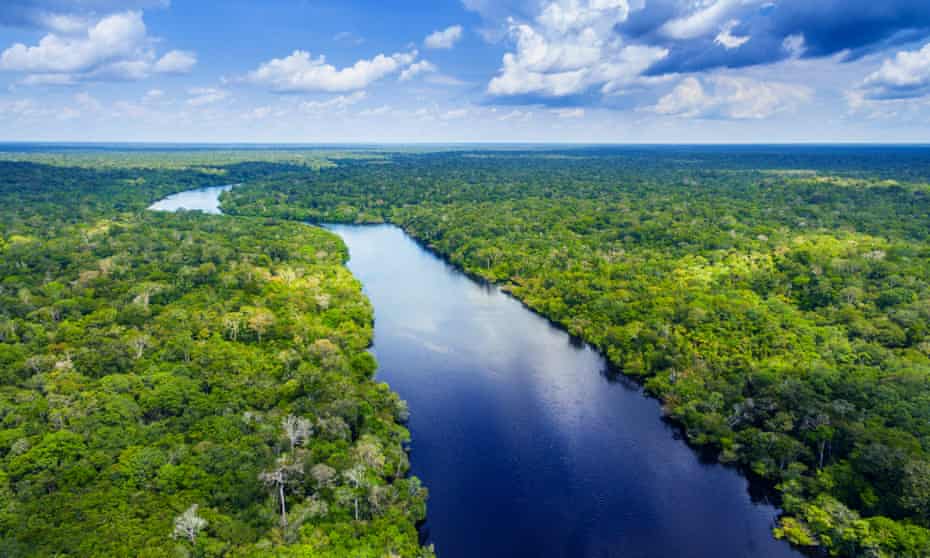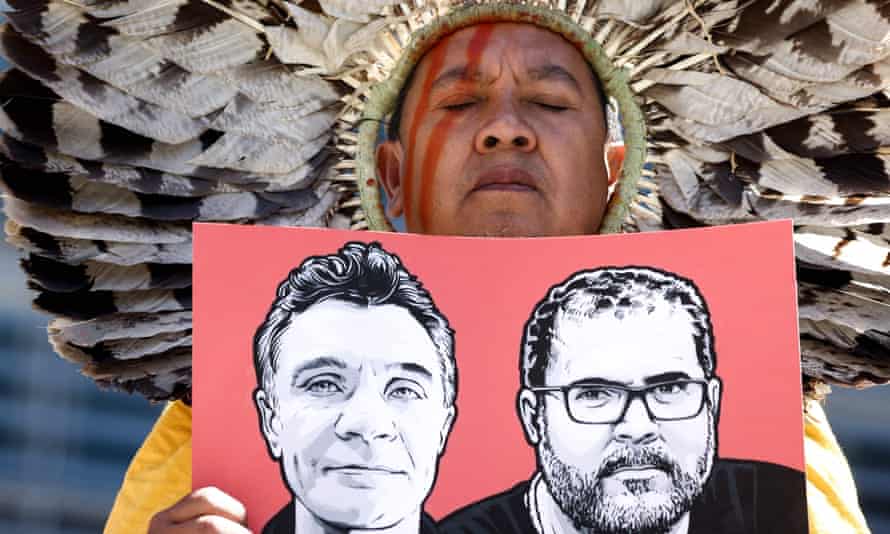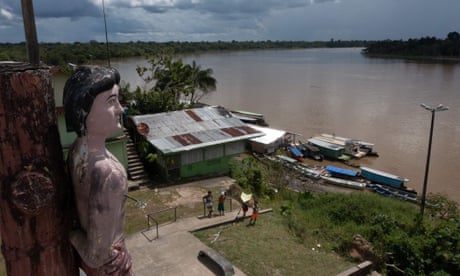‘Bolsonaro’s fingerprints are all over this: how president’s war on Amazon played part in double killing

The Guardian - Andrew Downie in São Paulo - Sat 18 Jun 2022 16.00
Brazil’s leader has steadily attacked those defending the region where journalist Dom Phillips and Indigenous expert Bruno Pereira lost their lives
If Jair Bolsonaro had not been elected Brazilian president in October 2018, the relationship between Dom Phillips and Bruno Pereira might have been different and so might their fateful last trip to the Amazon.
When they first met, Phillips was a British journalist, and Pereira a senior figure with the Brazilian government’s Indigenous agency, Funai. The explorer opened doors to jungle communities for Phillips to research a book on sustainable development.
As head of Funai’s isolated Indians division, Pereira helped Indigenous peoples under threat of invasion delineate their land and set up fences, guard posts, and warning signs.
But when he was fired in 2019, just days after leading a successful operation to destroy an illegal mining operation inside the Yanomami Indian reservation, Pereira was forced to start afresh. Working with the Indians of the Javari Valley, close to Brazil’s border with Peru, he began a similar job, this time without the protection of the state.
Pereira went missing with Phillips on 5 June after returning from a reporting trip on the Itaquaí River. Their bodies were discovered last week, buried in the depths of the forest. Two men are under arrest, suspected of killing them after they discovered their illegal fishing operation.
Pereira’s dismissal from Funai in late 2019 was just one example of how the far-right Bolsonaro has ostracised those whose commitment to nature clashes with his pro-business ethos. The killing of the two men is another tragic illustration of how the president’s policies are fatal, not just for the environment but for those who care about it.
“The bullets that kill journalists, activists, and Indigenous people in Amazonia are bought with money from land grabs, illegal mining and logging,” said Marcio Astrini, the executive secretary of Observatório do Clima, an environmental NGO.
“Through his omission in the search efforts or the way he has encouraged these criminals, the Bolsonaro government’s fingerprints are all over this tragedy.”

In a country the size of Brazil, which contains about 60% of the Amazon rainforest, state environmental organizations are on the frontlines of the war against climate change.
In addition to the environmental ministry and Funai, there’s Ibama, the ministry’s conservation and sustainable development arm; Inpe, the body that monitors deforestation; and the Chico Mendes Institute for Biodiversity Conservation, named after the rubber tapper whose murder in 1988 helped kickstart Brazil’s modern environmental movement.
Bolsonaro has systematically undermined them all, said current and former officials, reducing and demoralizing staff, lowering and withholding budgets, and introducing counter-productive legislation.
Ibama, for example, only spent 41% of its budget in 2021, the year deforestation hit a 15-year high, said Suely Araujo, its former president. Funai’s annual budget this year was 746 million reais (£119 million) but only a quarter of it was spent on Indigenous communities. And the annual budget for the environmental ministry fell from 3.4bn reais in 2019 to 2.5bn reais in 2021.
Even when the government is active, those on the frontlines are just as likely to be military men rather than real experts in the field. As a former army captain and lover of all things olive green, Bolsonaro has purged qualified staff.
“They put people who don’t know what they are doing in charge,” said Araujo. “They don’t know the body and they don’t know the Amazon. It is planned and deliberate, to weaken oversight. And it is working very well, unfortunately.”
Bolsonaro’s destructive ire has a particularly damaging effect on the estimated 235 Indigenous tribes who make their home the length and breadth of this continent-sized nation.
Bolsonaro once congratulated the US cavalry for decimating North American Indians and lamented that Brazilian soldiers had not done the same. Before taking office, he vowed not to give Indigenous people “one more square centimeter of land” and he has proudly kept that promise.
Instead, the president is working to do the opposite by opening up Indigenous land to loggers, miners, and other extractive industries. He has increased the number of pesticides authorized for use in Brazil and wants to make it easier for unscrupulous settlers to legalize the land they grab. He made 593 regulatory changes linked to the environment in 2020 alone.
“The government is dismantling environmental protections,” said Monica Sodré, executive director of the NGO Network for Political Action on Sustainability. “It didn’t start with this administration but it has become much sharper and more evident under this president. And it hasn’t just weakened laws, with this rhetoric of saying absolutely anything, it encourages illegality and acts like (the killing of Bruno and Dom).”
Bolsonaro’s incendiary rhetoric is integral to his divisive presidency and a factor in the rise in violence against activists and journalists. Of the 430 attacks recorded on the media in 2021, Bolsonaro or his state broadcasting company were involved in two-thirds of them, according to figures from the National Federation of Journalists.
Likewise, in the Amazon region, 8,729 people died intentional violent deaths in 2020, most of them related to agrarian and environmental conflicts, according to figures from the Brazilian Forum on Public Safety. That increase came as deaths in other rural communities fell, and highlighted the dangers inherent in the wild west of the Javari Valley.
Those dangers were not unknown to Pereira, who had worked in the region for years. Loggers, miners, and fishers make the area fraught, as do increasingly powerful drug gangs crossing the border with Peru.
But his loss is a particular blow to Univaja, the local Indigenous rights organization with whom he partnered after leaving Funai.

It doesn’t have state backing but Pereira’s gift for fundraising and bridge-building, coupled with Bolsonaro’s disregard for Funai, means Univaja now has better boats and better equipment than the government body.
Members of Univaja were among the first people on the river to help search for Phillips and Pereria after they went missing on 5 June. Funai had no boats in working order and had to hire launches to assist in the efforts.
“We don’t have the slightest structure anymore, not even to do routine oversight operations,” said one Funai employee with knowledge of the Amazonian operations. “Univaja is empowering the Indigenous people to look after themselves.”
With Bolsonaro in charge, it is perhaps the best alternative.
Commentary:
HUMAN SYNTHESIS
COPYRIGHTS
Copy & Paste the link above for Yandex translation to Norwegian.
WHO and WHAT is behind it all? : >
The bottom line is for the people to regain their original, moral principles, which have intentionally been watered out over the past generations by our press, TV, and other media owned by the Illuminati/Bilderberger Group, corrupting our morals by making misbehavior acceptable to our society. Only in this way shall we conquer this oncoming wave of evil.
All articles contained in Human-Synthesis are freely available and collected from the Internet. The interpretation of the contents is left to the readers and does not necessarily represent the views of the Administrator. Disclaimer: The contents of this article are of the sole responsibility of the author(s). Human-Synthesis will not be responsible for any inaccurate or incorrect statement in this article. Human-Synthesis grants permission to cross-post original Human-Synthesis articles on community internet sites as long as the text & title are not modified.
HUMAN SYNTHESIS